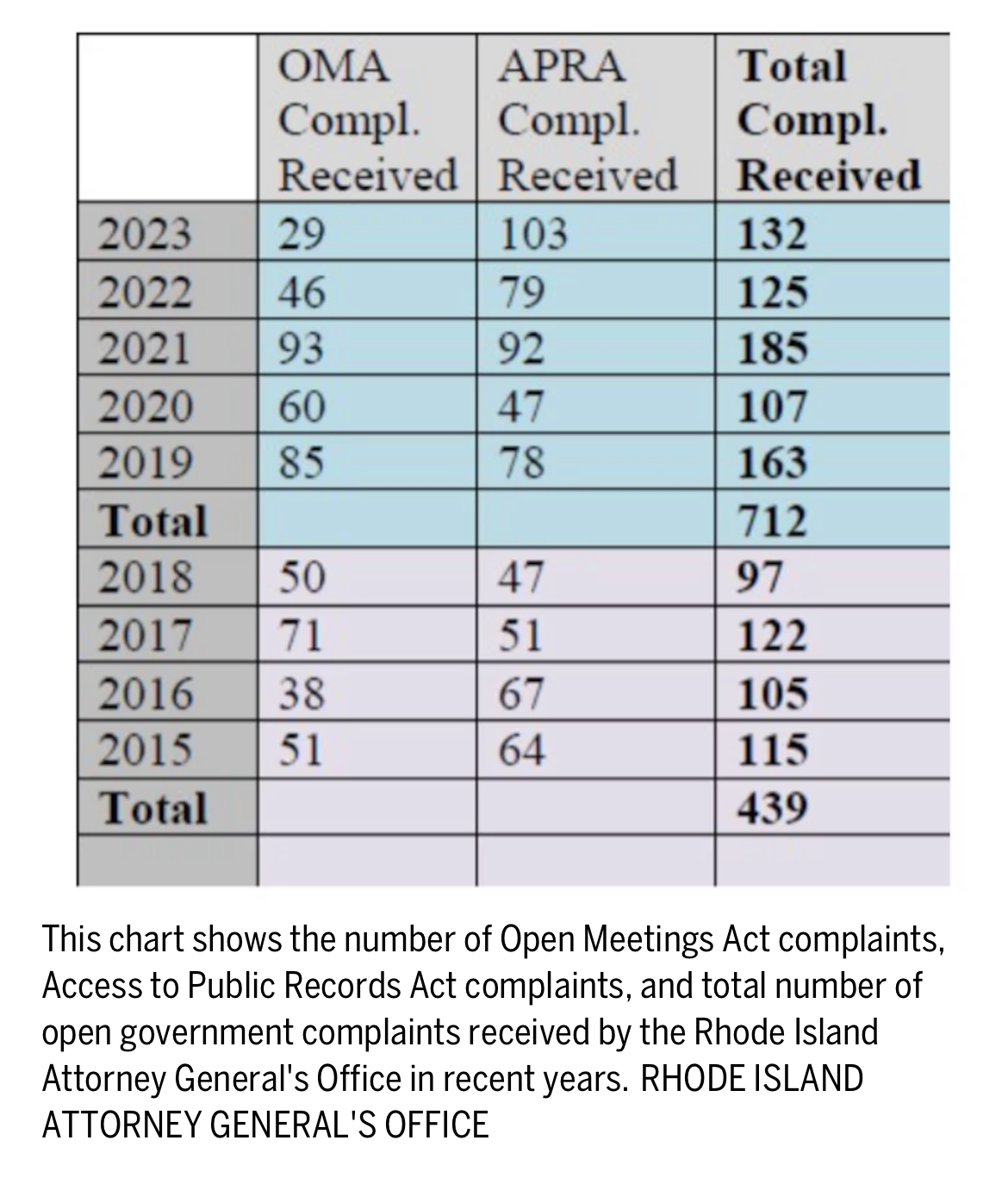
The Boston Globe reports that Rhode Island Attorney General Peter F. Neronha said at the outset of his office’s annual Open Government Summit on Friday that his office plans to begin levying fines against the cities, towns, and state agencies that consistently flout the state open records law.
Neronha expressed reluctance "to hit cities and towns with fines for knowing and willful violations of the Access to Public Records Act" at the expense of taxpayers, but noted a substantial uptick in the number of appeals to his office.
https://www.bostonglobe.com/2024/07/26/metro/rhode-island-public-record…
“'When we see a pattern of consistently withholding records that anyone who has gone to [open government] training knows should be turned over, you should know that a fine is coming,' Neronha told the audience, which includes many of the public officials who handle open records requests."
Neronha said "he sees lawyers now getting 'in the way' of public transparency.
"'Lawyers get too involved in what I believe are relatively simple issues of disclosure.'"
"Neronha said his office does not treat the press 'as our enemy,' and reporters are asking questions on behalf of the public. 'If we can’t answer the questions that they have, perhaps it’s time to rethink what it is that we are doing,' he said. 'And I would suggest that if we are simply not answering the questions because we do not want to, then we are not doing our duty as public officials.'"
Importantly, Kentucky's open records law does not authorize Attorney General Russell Coleman to impose fines on public agencies for violations of our law. KRS 61.880(2)(a) limits his authority to issuing "a written decision stating whether the agency violated" the law. (https://apps.legislature.ky.gov/law/statutes/statute.aspx?id=51394)
Those decisions, if not appealed to circuit court, have "the force and effect" of law, and are enforceable in circuit court.
If a Kentucky's circuit court finds "that the records were willfully withheld," the court has authority to award costs, including reasonable attorney's fees, incurred in connection with the legal action. It is also "within the discretion of the court to award the person an amount not to exceed twenty-five dollars for each day that he was denied the right to inspect or copy said public record." (https://apps.legislature.ky.gov/law/statutes/statute.aspx?id=23066)
"Attorney's fees, costs, and awards . . . shall be paid by the agency that the court determines is responsible for the violation." Ultimately, it is taxpayers who bear the cost of public agency noncompliance with/defiance of the open records law.
“'Willful,'" Kentucky's Supreme Court has observed, "connotes that the agency withheld requested records without plausible justification and with conscious disregard of the requester's rights."
In affirming the Franklins Circuit Court's imposition of $756,000 in penalties (and $400,000+ in attorneys' fees) on the Cabinet for Health and Family Services in the child fatality or near fatality records case that extended over five years, the Kentucky Court of Appeals declared:
"The penalty we affirm is a substantial one. Substantial, too, is the legal obligation the Cabinet owed the public and the effort it expended in attempting to escape it.
"While it will ultimately be the public that bears the expense of this penalty, we maintain that the nominal punishment of an egregious harm to the public's right to know would come at an even greater price.
"The Cabinet's conduct in this case was indeed egregious. The face of the record reveals the 'culture of secrecy' of which the trial court spoke; and it evinces an obvious and misguided belief that the Open Records Act is merely an ideal – a suggestion to be taken when it is convenient and flagrantly disregarded when it is not. We could not disagree more.
"'Publicity,' Justice Brandeis tells us, 'is justly commended as a remedy for social and industrial diseases. Sunlight is said to be the best of disinfectants; electric light the most efficient policeman.'
"The Open Records Act is neither an ideal nor a suggestion. It is the law. Public entities must permit inspection of public records as required or risk meaningful punishment for noncompliance. Rigid adherence to this stark principle is the lifeblood of a law which rightly favors disclosure, fosters transparency, and secures the public trust."
https://caselaw.findlaw.com/court/ky-court-of-appeals/1726554.html
A second appeal involving similar records requested by The Todd County Standard resulted in the imposition of $16,000+ in penalties, fees, and costs.
https://cases.justia.com/kentucky/court-of-appeals/2015-2012-ca-000336-…1449846092
One thing is absolutely certain: public agency lawyers regularly "get in the way" of government transparency, erring on the side of secrecy rather than openness -- notwithstanding the open records law's statement of legislative policy:
"The General Assembly finds and declares that the basic policy of KRS 61.870 to 61.884 is that free and open examination of public records is in the public interest and the exceptions provided for by KRS 61.878 or otherwise provided by law shall be strictly construed, even though such examination may cause inconvenience or embarrassment to public officials or others."
https://apps.legislature.ky.gov/law/statutes/statute.aspx?id=23058
If public agency legal staffs expended half the time on open records compliance, rather than circumvention, the purported strain on their resources would be cut in half (or more).


